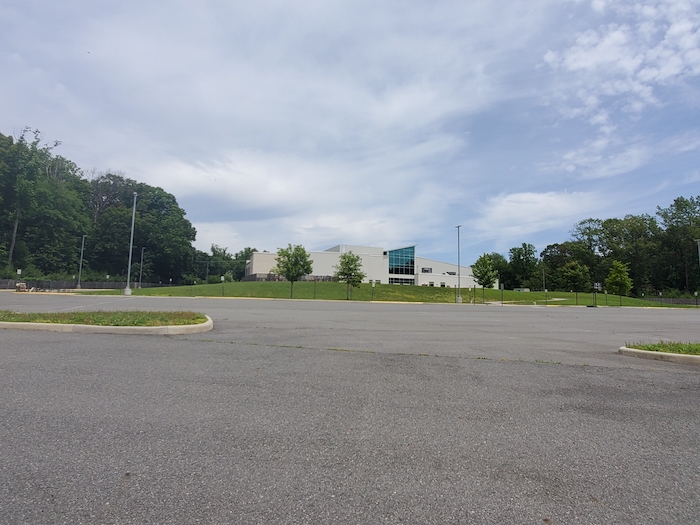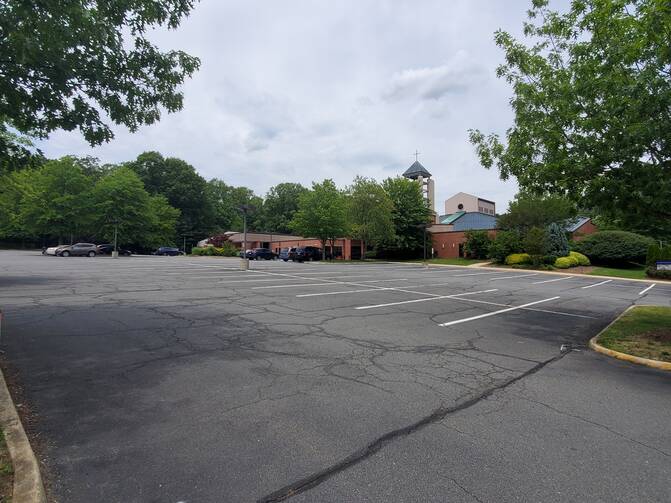If you spend a lot of time on “urbanist Twitter,” you may come across some hostility to churches—or, rather, to their parking lots. The average suburban church in the United States, of any denomination, can look uncannily like a big-box store or self-storage center, set back far from the road and surrounded by an ocean of asphalt. And unlike the parking lots at those other suburban mainstays, most church lots are empty six days a week.

Perhaps the location of churches along suburban arterial roads says something about our society’s attitude toward the centrality of faith. Or perhaps it merely follows from the land-use rules that shape sprawl in general, including regulations that stipulate a minimum number of parking spots based on a building’s use.
While suburban churches on large lots are often associated with Protestant “megachurches,” there’s a supersizing trend in Catholic parishes, too, in response to the shift of the U.S. Catholic population away from older Northern cities and toward the South and West. In many of our newer parishes, which often serve large but dispersed Catholic populations, there is no practical alternative to being near a highway and providing a large parking area. But parishes can still think about how to use their properties in more holistic ways. One big question: What could be done with parking lots outside of weekends and holy days?
While suburban churches on large lots are often associated with Protestant “megachurches,” there’s a supersizing trend in Catholic parishes, too.
In most places, zoning laws make it hard to repurpose all that space for anything but parking, but as the last year has shown us, parking lots and car-centric streets can indeed become more useful outdoor spaces. Sprawling church properties made open-air Masses and drive-through confession possible during the most difficult days of the pandemic. They can also be used as staging areas for disaster relief and can aid in the sheltering of people experiencing homelessness. Such uses can clash with zoning ordinances or fire regulations; for example, even temporary shelters can be construed as a “residential” use on a property without residential zoning. But there can be workarounds: A temporary ordinance in Palo Alto, Calif., which took effect early this year, permits churches to temporarily house people sleeping in vehicles.
Other churches occasionally hold farmers’ markets, opening their otherwise dormant parking lots to small business owners regardless of religious affiliation. But this can generate problems, too. In 2009, several churches around Spokane, Wash., were ordered to close their parking-lot farmers’ markets or pay taxes on the real estate. The issue was that operating even a very small-scale commercial business on tax-exempt land was not allowed, even if it was not the church itself engaging in the commercial activity.
Churches occasionally hold farmers’ markets, opening their otherwise dormant parking lots to small business owners regardless of religious affiliation.
This is not an issue in all municipalities, but certainly, many churches’ legal counsel would advise avoiding activities that have the potential to bring legal scrutiny or jeopardize tax-exempt status. And many, with a small staff and busy clergy, do not have the capacity to take on the zoning board.
Some churches, however, have gone big. In late 2019, a coalition of housing advocates and mostly Protestant houses of worship, under the banner “Yes in God’s Back Yard,” successfully lobbied the city of San Diego to ease parking minimums and permit affordable housing on formerly mandated parking space around churches. As of 2020, at least one San Diego church has gone forward with such a housing project.
Pasadena, Calif., has been considering liberalizing its own parking minimums, also with an eye toward allowing churches to make fuller use of their properties. And a California bill signed into law in September 2020 “prohibits local agencies from denying a housing project proposed on property owned by religious institutions solely on the basis of parking.” (In 2020 the California legislature also considered a more ambitious statewide “YIGBY” bill modeled on the San Diego reform, but that one died in committee.)
For Catholic parishes, similar explorations may be better suited for the diocesan, rather than the parish, level. While this can make activism more difficult for individual parishes, it can also allow creative ideas to be implemented on a large scale, and advocacy at the diocesan level can accompany efforts to achieve zoning reforms on a regional or statewide basis.
It is easy to look at empty, sprawling parking lots and wonder if, by not paying taxes, the churches they belong to are somehow failing to be productive—financially, anyway. But a more fruitful framing would be to focus not on extracting tax revenue but on enabling houses of worship to use their own real estate more productively. Some may already want to, and it is ironic that they are forced to seek permits, or engage in lobbying, to do so. Bad incentives and a byzantine land-use regime are often the province of libertarians or policy wonks, but they affect everybody every day. Loosening them would make our communities stronger. It could help reduce reliance on the automobile. And, in the social and environmental spirit of “Laudato Si’,” it might even help protect our common home.
Read more from America:










